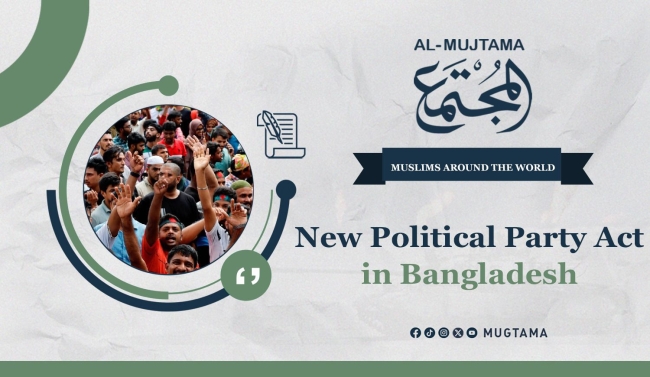New Political Party Act in Bangladesh Featured
The interim government in Bangladesh is planning to enact a new law regulating the functioning of political parties in the country, known as the Political Parties Act. Brigadier General (retd) M. Sakhawat Hossain, Advisor to the Ministry of Home Affairs, said that drafting the law has already begun. The law will be finalized after consultation with the relevant authorities, and the government will oblige political parties in the country to abide by its provisions.
Hossain told the media that “any party that does not abide by this law will not be allowed to engage in political activity in the country.” The existing laws in Bangladesh require political parties to register with the Election Commission if they wish to participate in elections using their name and symbol.
The new law complements the 2008 amendments to the Representation of the People Ordinance, which is still in force today. The question that arises is: Why does the government see the need to enact a new political party law? And what are the possible provisions that this law could include?
What is the Political Parties Act
The Political Parties Act is a legal framework that aims to enhance transparency and accountability in the registration, management, and accountability of political parties. The law includes a set of rules that parties must follow, and if they violate them, they may face strict legal action, including deregistration.
Advanced Draft
A specialized committee is usually formed to draft the bill, considering various public and private aspects, and after consulting with stakeholders, including political parties, the bill is finalized and legally adopted.
It is worth noting that such laws exist in many countries, such as the United Kingdom and Germany. In the United Kingdom, this law is known as the “Political Parties, Elections and Referendums Act 2000,” and aims to ensure transparency in the management and collection of funds for political parties, in addition to regulating campaign expenses.
Periodic Reports
Under British laws, political parties are required to submit periodic reports on their income and expenses to the Election Commission and are prohibited from accepting financial donations from foreign parties. In addition, strict limits are imposed on campaign expenses, and parties are not allowed to exceed these limits.
New Legal Framework
This step aims to establish a new legal framework that enhances the integrity of political life in Bangladesh and contributes to creating a more transparent and fairer political environment.
The Political Parties Act of Bangladesh is part of the legal framework that aims to regulate the functioning of political parties in the country and ensure their integrity and transparency. This law includes a set of conditions and requirements that political parties must meet to obtain registration and participate in political life.
Requirements to be met for registration of political parties in Bangladesh
According to the “Political Parties Registration Rules” of 2008, any political party that wishes to compete in elections under its own symbol must be registered with the Election Commission. The basic requirements for obtaining this registration are as follows:
- Parliamentary representation: A political party can apply for registration if it has won at least one seat in any election held after the independence of Bangladesh.
- Vote share: The party must have won at least five percent of the votes in the last election.
- Local presence: The party must have a party committee in at least 21 districts or 200 local administrative units (upazilas).
Required Documents and Fees
When applying for registration, the party must submit a fixed amount of money as a registration fee, along with a number of necessary documents such as:
- Party constitution.
- Party bylaws.
- Election manifesto.
- Party logo.
- Party flag image.
- Names of Central Committee members.
- Source of party funds.
- Bank account details.
Restrictions and Prohibitions
Under the Representation of the People Act (RPO), a registered political party is prohibited from accepting gifts, donations or grants from any foreign country or institution. Nor is it permissible to register any party whose ideology threatens the sovereignty, unity, and security of Bangladesh.
New Political Parties Act
The interim government of Bangladesh is planning to issue a new Political Parties Act to ensure transparency and accountability in the management of political parties. The proposed law aims to put parties within a legal framework that reduces the possibilities of corruption, promotes internal democracy, and prevents parties from turning into dictatorships. It also aims to regulate fundraising and campaign expenditures, ensuring the integrity of the political process.
Analysts’ Views
Although there has been no official response from political parties on the new law, political analysts see it as a positive step towards enhancing transparency and accountability. Some argue that the actual implementation of the law will be crucial to achieving its desired goals, especially in light of concerns that the authorities will exploit it to suppress dissent, as has happened in some historical cases.
Timing and concerns
This law comes at a sensitive time, as the Awami League has been in power for more than a decade and a half and has faced accusations of restricting political freedoms. Some analysts believe that the law can be a means of controlling the political process, but it needs actual implementation to ensure that it is not used to suppress dissent or restrict political freedoms.


